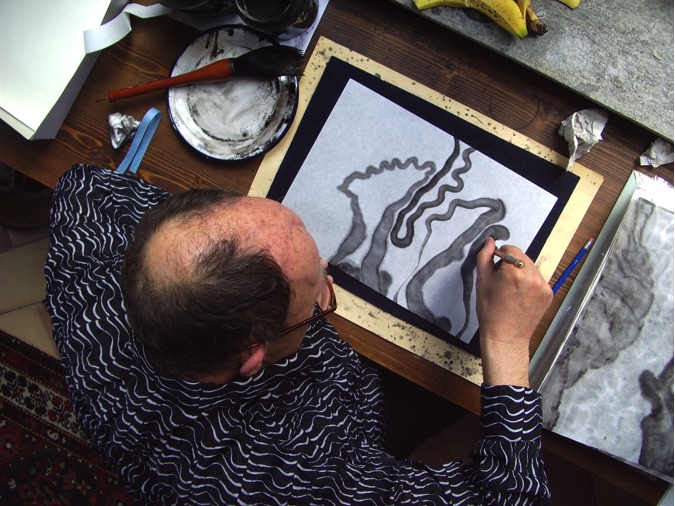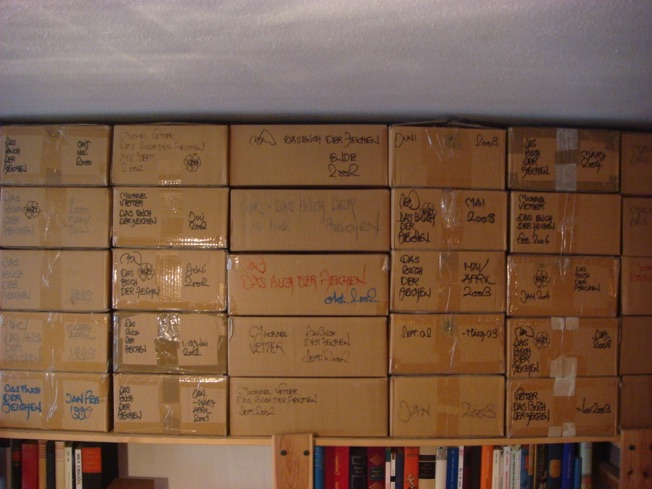Today it is 6 years ago since Michael Vetter (1943-2013) passed away. One year after his passing I wrote a blogpost called ‘Five Reasons to Remember Michael Vetter’ and those reasons still stand. In part I still ‘think through’ Vetter’s way of looking at the world and of looking at creative processes (not to mention in practising music and other arts). That is, I wonder how he did things I am doing or want to do, and try to find what I can still learn from him. Since that time (and in fact long before that, to be sure), my taste for music and sound ventures (or ventured) in many directions where his taste certainly did not go. But it is not his art alone that matters. With all that searching and groping, I sometimes lose a sense of what is essential. Not for music and sound per se, but for the bigger picture of how it all fits in with the other aspects of life (and death). And it is here that I find enduring inspiration from this versatile German artist.
Michael Vetter had a remarkable critical attitude towards a wide range of topics, traditions and disciplines. He knew exactly what he needed from them and was always able to state with great clarity how they related to each other and, if applicable, to his own work. Another feat is how he succeeded in developing a total vision for the many arts he practiced (fine arts, performing arts, and writing, to start with) and for spiritual and contemplative practises, primarily Christianity and Zen Buddhism. He knew both from inside out – and that is something not many composers or musicians could say. Most of them who claim Zen inspiration have flirted with it or studied it from a distance. Vetter lived the life of a monk several months a year for a decade, practising alongside Japanese monks and the occasional foreigner. He also studied theology for some years, which at the time (early 1960s) meant deep-reading of existential and other philosophical and psychological authors. Small wonder a large portion of his work is imbued with themes at the heart of the human experience. Often, in fact, he looked one or more levels deeper, beneath the surface, to find the roots of symbol, communication, emotion, illusion, aesthetic form, signs …

Michael Vetter making Indian ink drawings, Academia Capraia, Italy, 2009 (photo by Mark van Tongeren)

Some of Michael Vetter’s boxes with about two years worth of daily ink drawings, Das Buch der Zeichen. Photo by Mark van Tongeren
There is a lot of music out there that can touch me deeply, from the abstract (Morton Feldman’s Coptic Lights) to the popular (Stevie Wonder’s Black Man or As, which recently made me burst out in tears), from the dream-like and hallucinating (Biosphere’s Substrata) to the Romantic (Schubert/Müller’s Winterreise), etc .etc. And even though I know and do believe that quite a few of all those artists that I like have interesting ideas, I also know that many of them don’t necessarily have a vision that resonates deeply with me. The case with Vetter is different. He was someone whose works I often enjoyed or admired, but who also inspired me with his grand vision about, well, almost anything. I have deep respect for the way he could balance his own interests in the arts, in society, in spirituality and religion, and –not last but not least either – in everyday life. And then how he weaved all those themes together in a remarkably consistent and coherent whole, so that each part could always be linked in multiple ways to any other part. Many of us would at some point have to let others do the talking, for example when tough philosophical questions come up; or shy away from certain artistic challenges; or not quite know how our contemporary work relates to, say, late mediaeval painters; not so with Michael. He would always have an answer and keep you wondering about the next three questions. Which, of course, he would whole-heartedly welcome and answer too.
O yes, it is time I write up some of my ideas about him in a more substantial way – even if it were to see if I could emulate his ability to answer just a single tough question of some scope (I did try it, partly). The magnitude of his vision was simply too much to know where to begin during these past six years, but I consider it not yet too late to do so.
I still hear you, Michael Vetter!
Bonus video: Jetzt… Du (Now… You), from the 1986 Zen record series, played on the Japanese koto zither.


